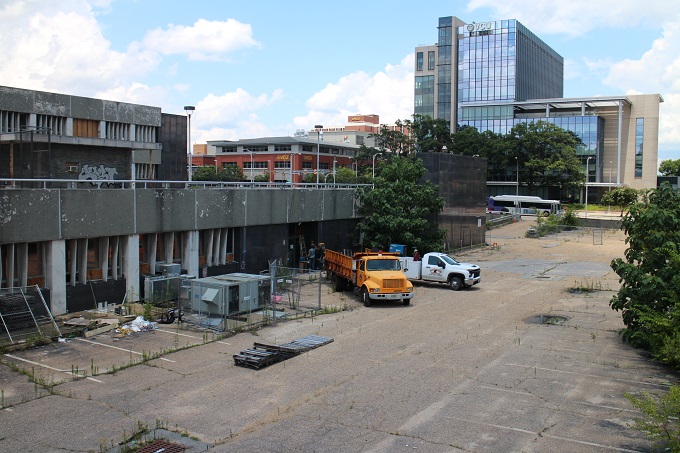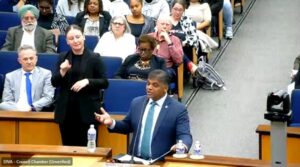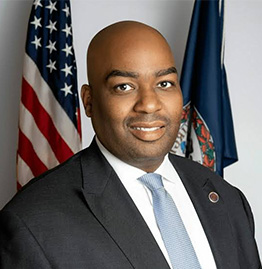
A rendering of the VCU Health-anchored office tower and complex that would have replaced the Public Safety Building. (BizSense file images)
If the state says VCU Health is off the hook for $56 million in city real estate tax payments tied to a failed downtown development project, will the City of Richmond let the issue go, or will its new administration follow its predecessor’s threat of taking the health system to court?
It’s a question that has lingered since the General Assembly directed the health system, by way of budget language last year, to find a way to stop the annual payments, which VCU Health agreed to make as part of the ill-fated $325 million redevelopment of the city’s old Public Safety Building site.
It’s also a question that needs to be asked and answered, said Bill Leighty, a state government veteran who said he lost his job with Virginia Commonwealth University for not broaching the payments topic in a recent forum with Richmond Mayor Danny Avula.
Leighty, who served as chief of staff to former governors Mark Warner and Tim Kaine, said he was fired last month from his role as senior advisor and teacher at VCU’s L. Douglas Wilder School of Government and Public Affairs after he didn’t ask a submitted question about the topic while moderating a “Lunch and Learn” Q&A with Avula hosted by the school.
Despite being pressed by Wilder School Dean Susan Gooden and others on behalf of school namesake Doug Wilder, the former Virginia governor and Richmond mayor who has been a vocal critic of VCU’s handling of the project, Leighty said that the session that was billed as being about Avula’s vision for Richmond was not the appropriate venue in which to address the payments issue.
In an interview with BizSense, Leighty said last week: “I really don’t know what the text of the question was; I just saw the topic and realized that it would be wrong to put the honored guest in the situation of having to answer the question. I knew that it was a very disputed item.”
Leighty said he also based his in-the-moment decision on what he expects is a dispute that will wind up in court.
“I’m quite confident it will be in litigation very shortly. So, I thought it was an inappropriate question to that particular forum,” he said. “But let me make it clear: The question does need to be asked and it needs to be answered. That just was the wrong forum to do it.”
Requests for Wilder and Gooden to participate in this story were not returned.
Leighty’s dismissal is the latest drama surrounding the tax payments dispute, which started with the directive last year for VCU Health to figure out how to stop making the payments, called general obligations or payments in lieu of taxes.
Since real estate that is owned by VCU or VCU Health is typically exempt from local taxes, the payments were worked into the project’s development agreement to ensure that the site remained tax revenue-generating for the city, regardless of how promptly, or successfully, the property was developed.
If paid in full over 25 years, the payments, which were to increase incrementally, would total nearly $56 million.
Litigation threatened
Since the project collapsed three years ago – requiring VCU Health, as its anchor tenant, to pay a $73 million exit fee and other costs – the health system has made three of the general obligation payments, totaling about $2 million. But it did not make a roughly $2 million payment that was due last June, following the state directive last year.
The directive drew a rebuke from then-mayor Levar Stoney, who said VCU Health’s obligation to make the payments is contractual and remains legally binding. Last November, in a letter requesting mediation with the health system, Stoney said the city was prepared to pursue litigation over the payments.
VCU Health, which had reported back to legislators that dialogue with the city had reached an impasse, agreed in December to the mediation request. But mediation never commenced over the course of the administration change from Stoney to Avula, who has not made clear whether he intends to likewise hold VCU Health to the payments.
Last month, when asked about the mediation’s status, Avula told BizSense that no steps had been taken as of mid-February, adding that the parties agreed to the mediation before he was installed as mayor.
Avula said he’d figure out if mediation was still necessary in coming weeks. Days later, during this year’s assembly session, legislators included new language in the budget that would allow VCU Health to not make any further payments.
That language was not altered in the budget amendments that Gov. Glenn Youngkin delivered last week, making it likely that the language will be included in the final budget and become law. The General Assembly is scheduled to reconvene this week to consider the amended budget.
Avula was not made available for an interview for this story. A city spokesperson provided a statement that said that, prior to the end of this year’s assembly session, the city expected “to continue conversations with VCU Health leaders in an effort to resolve the terms” of the project agreement.
The statement added: “The amended state budget approved by the legislature in February, and subsequently evaluated by the Governor, includes language that appears to block future payments from the health system to the City – as called for under the terms of the contract – without prior legislative authorization. While these developments are disappointing, the City continues to evaluate the budget to better understand its potential implications.”
In his budget presentation to City Council last week, Avula noted the amount of nontaxable real estate in the city that is owned by VCU, VCU Health or other state or federal agencies or nonprofits as contributing to the city’s fiscal challenges. He said Richmond misses out on $63 million in annual revenue because of the amount of state and federal government-owned tax-exempt property in particular.
“Not being able to collect taxes on what is some of the most valuable property in the city dramatically limits our revenue-generating capacity,” Avula said. “I’m a proud VCU alum, I recognize the enormous tangible and intangible impact of our colleges and universities including VCU, but these are the facts about our limited tax base.”
In his report back to the state money committees last fall, VCU Health CEO Marlon Levy said the health system’s position remained that it is not obligated to continue the payments, adding that its statutory mission “is to provide care to the City’s most vulnerable citizens, not to subsidize government revenue because of (the project developer’s) failure to create a revenue-generating project.”
‘At the end of the day, the money is coming from the state’
It wasn’t clear which legislators pushed to have the latest stop-payment language added to the budget. The language states that VCU Health “shall not be required to remit any payment to the City of Richmond pursuant to” the 2021 development agreement for the project.
Sen. Lamont Bagby, who represents Richmond in the Senate and also serves on VCU Health’s board of directors, said he was neither against or supportive of the language being included, instead stressing a need for the two parties to work together.
Asked if he thought VCU Health should be bound to making the payments, Bagby said last week: “I think we’re beyond whether VCU should make the payment-in-lieu. We have two entities that have to work together that both receive significant funding from the commonwealth. At the end of the day, the money’s coming out through the commonwealth.”
Bagby said he suggested to both Stoney’s and Avula’s administrations to work with VCU or the state “to figure out how you can get more of that money on the front end.” He noted that the budget that was sent to the governor included an additional $50 million for Richmond’s combined sewer overflow project, as well as a change to give the city more tax revenue from Rosie’s Gaming Emporium parlors, whereas those funds previously went to New Kent County.
Suggesting that those budget items essentially amount to the $56 million that Richmond has sought from VCU Health’s tax obligation, Bagby said: “At the end of the day, the money is coming from the state coffers and/or (VCU Health) patients.”
Had the city gone ahead and sued VCU Health, Leighty, the dismissed Wilder School employee, said the General Assembly likely would have stayed out of the fray. Having previously worked for the Senate Finance Committee, Leighty said he’s learned that the General Assembly “is not usually willing to weigh in when there’s litigation. And perhaps because it’s not litigation, they did.”
If the state budget is approved with the stop-payment language included, Leighty said the directive would be within the assembly’s authority – and that Richmond would have a legal case to make against it.
While the legislature does not have authority to repeal or do away with a contract, Leighty said, it does have authority to defund a contract.
“The General Assembly does not have the power or authority to abrogate a contract, so contractually I would think that the city has pretty strong standing to go ahead and take the litigation route,” Leighty said. “Whether they’re successful or not is a different story.”
‘VCU is an important stakeholder for the city’

Demolition of the old Public Safety Building was underway last year, with VCU Health footing the $5 million bill.
Stoney’s mediation/litigation letter last fall was co-signed by then-City Council President Kristen Nye, who is no longer in office after stepping down at the end of her term in December. Attempts to reach current Council President Cynthia Newbille were unsuccessful last week.
Councilmember Stephanie Lynch said she would like to see the city move on from the dispute, though she acknowledged that some of her colleagues feel differently.
“I personally have no interest in continuing that fight. I think it’s the legislature’s prerogative, and we’ve seen them do it time and time again with various institutions that are under their purview,” Lynch said. “I think they saw the expenditure as something ultimately coming out of the general fund budget, and I think for us in the City of Richmond, we have to weigh that against a series of other benefits that we get from VCU.”
Lynch added: “I don’t think that VCU and the city do enough to really intentionally partner and collaborate, so I would love to see more of that. But I don’t think we get there by squabbling in the General Assembly or in a courtroom.
“VCU is an important stakeholder for the city, the city is an important stakeholder for VCU; it just doesn’t make sense for two 200-pound giants to go wrestling in the ring together,” Lynch said. “I think we’d be better suited identifying a work plan and maybe three things that we could tackle together over the next four years of this administration than trying to tango with each other in an adversarial way.”
Bagby expressed similar sentiments, noting that VCU Health also paid upwards of $5 million to complete the demolition of the city-owned Public Safety Building site. The site, now cleared, is now being considered by GRTC for a mixed-use development that would include a permanent bus transfer station.
“I want to make sure the city is stood up, and also VCU Health System. They did cover the cost of the demolition of the building,” Bagby said. “VCU is walking away with nothing. Richmond is walking away with support and still owning the property that has been cleared.”
Asked what effect the assembly’s directive could have on future contracts involving the state or related entities like VCU Health, Bagby said: “I think that’s a decision that the city’s going to have to make.”
“I would imagine they have their attorneys looking at not only the language that the Senate and the House sent over to the governor, but if the governor signs off on it, it’ll be the language that the state has approved (and) they would have the opportunity to have their attorneys look at that,” he said. “They also would have an opportunity to make an ultimate decision what they want to do. I will leave that up to them and support their efforts.”
Of the relationship between Richmond and VCU Health, Bagby added: “I want all those entities to not only be successful but flourish. We’ve got to keep those relationships strong, but we also need to make sure both remain whole.”

A rendering of the VCU Health-anchored office tower and complex that would have replaced the Public Safety Building. (BizSense file images)
If the state says VCU Health is off the hook for $56 million in city real estate tax payments tied to a failed downtown development project, will the City of Richmond let the issue go, or will its new administration follow its predecessor’s threat of taking the health system to court?
It’s a question that has lingered since the General Assembly directed the health system, by way of budget language last year, to find a way to stop the annual payments, which VCU Health agreed to make as part of the ill-fated $325 million redevelopment of the city’s old Public Safety Building site.
It’s also a question that needs to be asked and answered, said Bill Leighty, a state government veteran who said he lost his job with Virginia Commonwealth University for not broaching the payments topic in a recent forum with Richmond Mayor Danny Avula.
Leighty, who served as chief of staff to former governors Mark Warner and Tim Kaine, said he was fired last month from his role as senior advisor and teacher at VCU’s L. Douglas Wilder School of Government and Public Affairs after he didn’t ask a submitted question about the topic while moderating a “Lunch and Learn” Q&A with Avula hosted by the school.
Despite being pressed by Wilder School Dean Susan Gooden and others on behalf of school namesake Doug Wilder, the former Virginia governor and Richmond mayor who has been a vocal critic of VCU’s handling of the project, Leighty said that the session that was billed as being about Avula’s vision for Richmond was not the appropriate venue in which to address the payments issue.
In an interview with BizSense, Leighty said last week: “I really don’t know what the text of the question was; I just saw the topic and realized that it would be wrong to put the honored guest in the situation of having to answer the question. I knew that it was a very disputed item.”
Leighty said he also based his in-the-moment decision on what he expects is a dispute that will wind up in court.
“I’m quite confident it will be in litigation very shortly. So, I thought it was an inappropriate question to that particular forum,” he said. “But let me make it clear: The question does need to be asked and it needs to be answered. That just was the wrong forum to do it.”
Requests for Wilder and Gooden to participate in this story were not returned.
Leighty’s dismissal is the latest drama surrounding the tax payments dispute, which started with the directive last year for VCU Health to figure out how to stop making the payments, called general obligations or payments in lieu of taxes.
Since real estate that is owned by VCU or VCU Health is typically exempt from local taxes, the payments were worked into the project’s development agreement to ensure that the site remained tax revenue-generating for the city, regardless of how promptly, or successfully, the property was developed.
If paid in full over 25 years, the payments, which were to increase incrementally, would total nearly $56 million.
Litigation threatened
Since the project collapsed three years ago – requiring VCU Health, as its anchor tenant, to pay a $73 million exit fee and other costs – the health system has made three of the general obligation payments, totaling about $2 million. But it did not make a roughly $2 million payment that was due last June, following the state directive last year.
The directive drew a rebuke from then-mayor Levar Stoney, who said VCU Health’s obligation to make the payments is contractual and remains legally binding. Last November, in a letter requesting mediation with the health system, Stoney said the city was prepared to pursue litigation over the payments.
VCU Health, which had reported back to legislators that dialogue with the city had reached an impasse, agreed in December to the mediation request. But mediation never commenced over the course of the administration change from Stoney to Avula, who has not made clear whether he intends to likewise hold VCU Health to the payments.
Last month, when asked about the mediation’s status, Avula told BizSense that no steps had been taken as of mid-February, adding that the parties agreed to the mediation before he was installed as mayor.
Avula said he’d figure out if mediation was still necessary in coming weeks. Days later, during this year’s assembly session, legislators included new language in the budget that would allow VCU Health to not make any further payments.
That language was not altered in the budget amendments that Gov. Glenn Youngkin delivered last week, making it likely that the language will be included in the final budget and become law. The General Assembly is scheduled to reconvene this week to consider the amended budget.
Avula was not made available for an interview for this story. A city spokesperson provided a statement that said that, prior to the end of this year’s assembly session, the city expected “to continue conversations with VCU Health leaders in an effort to resolve the terms” of the project agreement.
The statement added: “The amended state budget approved by the legislature in February, and subsequently evaluated by the Governor, includes language that appears to block future payments from the health system to the City – as called for under the terms of the contract – without prior legislative authorization. While these developments are disappointing, the City continues to evaluate the budget to better understand its potential implications.”
In his budget presentation to City Council last week, Avula noted the amount of nontaxable real estate in the city that is owned by VCU, VCU Health or other state or federal agencies or nonprofits as contributing to the city’s fiscal challenges. He said Richmond misses out on $63 million in annual revenue because of the amount of state and federal government-owned tax-exempt property in particular.
“Not being able to collect taxes on what is some of the most valuable property in the city dramatically limits our revenue-generating capacity,” Avula said. “I’m a proud VCU alum, I recognize the enormous tangible and intangible impact of our colleges and universities including VCU, but these are the facts about our limited tax base.”
In his report back to the state money committees last fall, VCU Health CEO Marlon Levy said the health system’s position remained that it is not obligated to continue the payments, adding that its statutory mission “is to provide care to the City’s most vulnerable citizens, not to subsidize government revenue because of (the project developer’s) failure to create a revenue-generating project.”
‘At the end of the day, the money is coming from the state’
It wasn’t clear which legislators pushed to have the latest stop-payment language added to the budget. The language states that VCU Health “shall not be required to remit any payment to the City of Richmond pursuant to” the 2021 development agreement for the project.
Sen. Lamont Bagby, who represents Richmond in the Senate and also serves on VCU Health’s board of directors, said he was neither against or supportive of the language being included, instead stressing a need for the two parties to work together.
Asked if he thought VCU Health should be bound to making the payments, Bagby said last week: “I think we’re beyond whether VCU should make the payment-in-lieu. We have two entities that have to work together that both receive significant funding from the commonwealth. At the end of the day, the money’s coming out through the commonwealth.”
Bagby said he suggested to both Stoney’s and Avula’s administrations to work with VCU or the state “to figure out how you can get more of that money on the front end.” He noted that the budget that was sent to the governor included an additional $50 million for Richmond’s combined sewer overflow project, as well as a change to give the city more tax revenue from Rosie’s Gaming Emporium parlors, whereas those funds previously went to New Kent County.
Suggesting that those budget items essentially amount to the $56 million that Richmond has sought from VCU Health’s tax obligation, Bagby said: “At the end of the day, the money is coming from the state coffers and/or (VCU Health) patients.”
Had the city gone ahead and sued VCU Health, Leighty, the dismissed Wilder School employee, said the General Assembly likely would have stayed out of the fray. Having previously worked for the Senate Finance Committee, Leighty said he’s learned that the General Assembly “is not usually willing to weigh in when there’s litigation. And perhaps because it’s not litigation, they did.”
If the state budget is approved with the stop-payment language included, Leighty said the directive would be within the assembly’s authority – and that Richmond would have a legal case to make against it.
While the legislature does not have authority to repeal or do away with a contract, Leighty said, it does have authority to defund a contract.
“The General Assembly does not have the power or authority to abrogate a contract, so contractually I would think that the city has pretty strong standing to go ahead and take the litigation route,” Leighty said. “Whether they’re successful or not is a different story.”
‘VCU is an important stakeholder for the city’

Demolition of the old Public Safety Building was underway last year, with VCU Health footing the $5 million bill.
Stoney’s mediation/litigation letter last fall was co-signed by then-City Council President Kristen Nye, who is no longer in office after stepping down at the end of her term in December. Attempts to reach current Council President Cynthia Newbille were unsuccessful last week.
Councilmember Stephanie Lynch said she would like to see the city move on from the dispute, though she acknowledged that some of her colleagues feel differently.
“I personally have no interest in continuing that fight. I think it’s the legislature’s prerogative, and we’ve seen them do it time and time again with various institutions that are under their purview,” Lynch said. “I think they saw the expenditure as something ultimately coming out of the general fund budget, and I think for us in the City of Richmond, we have to weigh that against a series of other benefits that we get from VCU.”
Lynch added: “I don’t think that VCU and the city do enough to really intentionally partner and collaborate, so I would love to see more of that. But I don’t think we get there by squabbling in the General Assembly or in a courtroom.
“VCU is an important stakeholder for the city, the city is an important stakeholder for VCU; it just doesn’t make sense for two 200-pound giants to go wrestling in the ring together,” Lynch said. “I think we’d be better suited identifying a work plan and maybe three things that we could tackle together over the next four years of this administration than trying to tango with each other in an adversarial way.”
Bagby expressed similar sentiments, noting that VCU Health also paid upwards of $5 million to complete the demolition of the city-owned Public Safety Building site. The site, now cleared, is now being considered by GRTC for a mixed-use development that would include a permanent bus transfer station.
“I want to make sure the city is stood up, and also VCU Health System. They did cover the cost of the demolition of the building,” Bagby said. “VCU is walking away with nothing. Richmond is walking away with support and still owning the property that has been cleared.”
Asked what effect the assembly’s directive could have on future contracts involving the state or related entities like VCU Health, Bagby said: “I think that’s a decision that the city’s going to have to make.”
“I would imagine they have their attorneys looking at not only the language that the Senate and the House sent over to the governor, but if the governor signs off on it, it’ll be the language that the state has approved (and) they would have the opportunity to have their attorneys look at that,” he said. “They also would have an opportunity to make an ultimate decision what they want to do. I will leave that up to them and support their efforts.”
Of the relationship between Richmond and VCU Health, Bagby added: “I want all those entities to not only be successful but flourish. We’ve got to keep those relationships strong, but we also need to make sure both remain whole.”








I don’t understand how this legislation, targeted at a single preexisting contract, is in any legal- I think the GA and Governor have massively overstepped here.
$73 million to the city’s coffers benefits VCU too. That’s additional money that can help the city make necessary infrastructure improvements to make the city safer and more livable for the students and employees of VCU that call the city home.
The state and the governor need to stop thinking that Richmond is some sort of enclave that exists separate from Virginia.
It was a foolish contract for VCU Health to agree to. The city is the winner in the legal sense. But the state is the winner in the moral sense. Enforcing a payment in lieu of property taxes for a parcel that the city has back and can tax all it wants is dubious in most people’s eyes.
Richmond has a $3 billion budget, but “never enough money.” It’s hard to have sympathy for a government that’s allowed property taxes to skyrocket without adjustment for 17 years. Cry me a river.
Well we do have the authority to set differing rates for water and sewer for commercial vs residential (and vs water user) so maybe if the state can defund the obligation of the contract the City can quadruple the water and sewer rates for state owned parcels and affiliated entities that are PILOT properties. Give taxpayers a break on those high water bills (and get more money for water and sewer and storm water system capital funds). I mean it is ALL state funds anyway someone said.